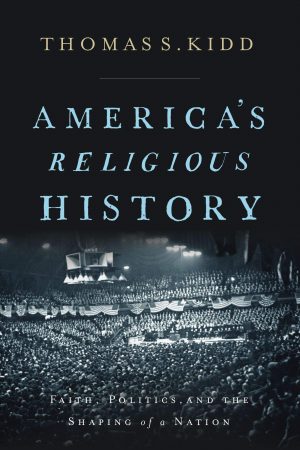American Christians, generally speaking, are ignorant of the history of their own religion in this country, let alone of other religions here. This is not due to a lack of excellent scholarly resources. If anything, there is a surfeit of excellent studies of American religion. The problem is that most Americans won’t read them because they are either too academic or too specific. (Or too long.)
Thomas S. Kidd is distinguished professor of history at Baylor University. His faith perspective is evangelical Christian generally and Southern Baptist specifically. His scholarly expertise is colonial and early U.S. history. Earlier this year, he published a two-volume survey, American History, for college students. Now, he’s published America’s Religious History, a single-volume introduction to that topic, also intended for college students—it’s published by Zondervan Academic—but readily accessible to a broad readership.
America’s religious history did not start with Christianity, of course, which was only introduced to the Western hemisphere beginning with Christopher Columbus in 1492. Kidd touches briefly on aspects of indigenous religious before colonization, but the main line of his story starts with first Catholic and then Protestant colonization efforts. While Catholicism always played an important role in the history of those lands that eventually became the United States, Kidd’s main focus throughout the book is on “the fate of Protestantism in America,” which is the nation’s “most powerful religious strain.” He does mention developments in other religions too, as well as in nonreligious, skeptical points of view.
As a Pentecostal Christian and ordained minister in the Assemblies of God, I was delighted by Kidd’s treatment of Pentecostalism in the last few chapters of the book. While I acknowledge that our tribe has problems—televangelist scandals, prosperity gospel preachers, etc.—our history also demonstrates a spiritual vitality and ethnic diversity that bode well for our future.
Kidd begins the book with three sentences that identify a thread running throughout America’s Religious History: “The story of American religion is a study in contrasts. Secular clashes with the sacred; demagoguery with devotion. Perhaps most conspicuously, religious vitality has existed alongside religious violence.” Readers looking for a chirpily cheery national history of Christianity specifically or religion generally will be disappointed by Kidd’s work. There’s much in America’s “lived religion,” its daily practice of faith, that is heartening, of course, but disheartening episodes abound too, especially when it comes to evangelicals and politics.
Kidd closes each chapter with a list of “Works Cited and Further Reading.” This list makes an excellent next step for readers who want go deeper on the historical developments surveyed in that chapter. While the publisher probably intends this book for use in a college classroom setting, I think it can also be used profitably by Sunday school classes, small groups, and book clubs. Or, of course, for the solitary reader seeking a better understanding of this nation’s religious history.
Book Reviewed
Thomas S. Kidd, America’s Religious History: Faith, Politics, and the Shaping of a Nation (Grand Rapids, MI: Zondervan Academic, 2019).
P.S. If you liked my review, please click “Yes” on my Amazon review page.

